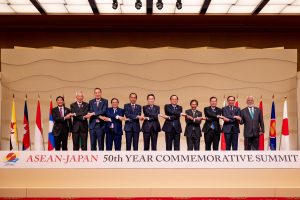Japan and Southeast Asian nations agreed to increase their maritime cooperation and to “promote a rules-based Indo-Pacific region that is free and open,” as they marked the close of a regional summit yesterday in Tokyo.
The ASEAN-Japan Commemorative Summit, which involved numerous multilateral and sideline meetings over three days, marked the 50th anniversary of relations between Japan and the Association of Southeast Asian Nations (ASEAN).
In the Joint Vision Statement issued at the close of the summit, Japan and ASEAN committed to “strengthening security cooperation, including maritime security cooperation.” The nations also reaffirmed their “commitment to uphold international law, including the U.N. Charter and the 1982 United Nations Convention on the Law of the Sea (UNCLOS).”
Expanding on this, an accompanying Implementation Plan pledged to “strengthen dialogue and cooperation for the maintenance of maritime security and safety, maritime order based on the rule of law, including freedom and safety of navigation and overflight and unimpeded commerce.” It also pledged to “enhance maritime domain awareness as well as cooperation among coastguards and relevant law enforcement agencies.”
While a good portion of these statements dealt with more mundane issues, such as economic cooperation, tourism, and people-to-people exchanges, the paragraphs dealing with maritime security carry outsized weight in light of the ongoing frictions in the South China Sea. Recent months have been marked by increasingly tense confrontations between Chinese and Philippine vessels in contested parts of the waterway, including two incidents in which Chinese ships have rammed or fired high-pressured water cannons at supply ships carrying food, water, and fuel to the Philippine soldiers stationed at Second Thomas Shoal in the Spratly Islands.
In an interview with the Japanese press on Saturday, Philippine President Ferdinand Marcos Jr. said that tensions in the South China Sea have “increased rather than diminished” in recent months. He warned that a “more assertive China” poses a “real challenge” to neighboring countries. The ASEAN-Japan joint statement did not explicitly mention China but during the summit, the leaders raised concerns over the “situation in East and South China Sea.”
All told, the proceedings of this week’s summit reflected the important role that Japan plays in Southeast Asia. The nation has been a long-standing source of foreign investment, and has played a crucial role in the industrial development of ASEAN’s largest economies. In recent years, however, this has also extended to the security realm, in which China’s growing maritime belligerence has created a growing strategic convergence between Tokyo and ASEAN, both of which face the hard edge of Chinese maritime power.
Five Southeast Asian nations – Vietnam, Malaysia, the Philippines, Brunei, and Indonesia – have outstanding maritime disputes with China, which claims most of the South China Sea under its expansive “nine-dash line” claim. Japan, too, has active maritime disputes with China in the East China Sea.
The summit saw Japanese Prime Minister Kishida Fumio and Foreign Minister Kamikawa Yoko hold sideline meetings with their counterparts from most ASEAN member states, during which various agreements were signed. Perhaps the most eventful agreement, as I wrote yesterday, was Japan’s elevation of its relations with Malaysia to the level of a Comprehensive Strategic Partnership, and the announcement of a grant of 400 million yen ($2.8 million) to boost Malaysia’s maritime security under Tokyo’s new Overseas Security Assistance (OSA) program, a complement to its voluminous Overseas Development Assistance, which will help recipient nations bolster their defense with various forms of non-lethal security aid.
Another designated target of the OSA, in addition to Fiji and Bangladesh, is the Philippines. The nation has already received a $4 million coastal radar system from Japan and has started talks with Tokyo on a reciprocal access agreement that would allow the deployment of military forces on each other’s soil. Japan has also expressed interest in taking part in joint maritime patrols with the Philippines, including in contested areas of the South China Sea that have witnessed the recent confrontations with China.
Needless to say, China’s government mouthpiece Global Times was not impressed by the Tokyo summit and Japan’s efforts to bolster security ties with Southeast Asian partners. Citing “experts,” it stated that “if defense cooperation between Japan and Southeast Asian countries is directed against a third party, it will have a very negative impact on the stability of the regional order.”
Last month, the same publication stated that Japan’s “unilateral manipulation of Southeast Asia will not only exacerbate the divisions within the ASEAN bloc but also escalate tensions in the South China Sea region.”
If the tenor of the Global Times can be taken as an approximate reflection of official thinking in Beijing, the growing security cooperation between Japan and ASEAN is a subject of growing consternation.

































